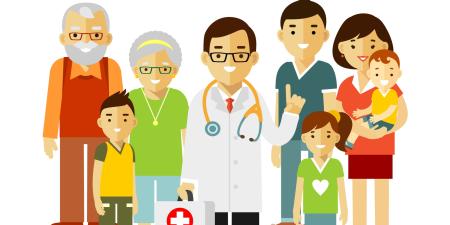Case
Dr. Twitchell, a family physician, is scheduled to meet with 18-year-old Andrew this afternoon. "Drew" is an only child and has always looked up to Dr. Twitchell as a mentor. Whenever he comes to the office, he asks Dr. Twitchell's advice about something, sometimes medical, sometimes not. Dr. Twitchell has consistently gotten the impression that Andrew does not know that his parents are carriers of sickle cell anemia, and Andrew has never been tested. Despite his urgings, Andrew's parents have never committed to tell him about their status.
As Dr. Twitchell enters the exam room, he begins, "How are you doing today, Drew?"
Andrew blurts out, "Well, I'm getting married."
"That's exciting news, I bet your parents are excited."
Andrew responds quietly, "Well, they don't exactly know yet. We're planning to elope in Vegas. Neither of us has ever been to Vegas before, and Vanessa doesn't want to make a big deal out of it anyway."
"Don't you think your parents would like to know about your wedding, Drew?" Dr. Twitchell asks.
Andrew shifts uncomfortably.
"Well, Drew, let's leave it at that. Just remember that I think you should let your parents know."
As Dr. Twitchell continues the examination, he wonders how to get Drew the information about his parents' carrier status without telling his parents he plans to elope.
Commentary
Dr. Twitchell has a classic "time-forced" dilemma (due to an inability to address a long-term ethical dilemma)—or does he? Both of Andrew's parents are known carriers of the sickle cell trait. Dr. Twitchell has tended to their care and that of their son, Drew, for years. The case ends with Dr. Twitchell considering how he should address the concern he has regarding Drew's genetic risk.
Given Drew's lack of symptoms we can safely assume he does not have sickle cell anemia, but he has a 66 percent probability of being a carrier, like his parents, and a 33 percent probability of not having the trait at all. These possibilities raise 2 questions: (1) Why was this consideration never addressed during his adolescence when Drew could have fathered a child? and, (2) Why do his parents not want to divulge this important health information to their only son?
One would hope Dr. Twitchell has some information here that may prove helpful. If Dr. Twitchell divulges the parents' genetic information to Drew, it would likely be construed as a violation of the parents' autonomous right to keep their health information private. To tell the parentsabout Drew's intention to wed (and thereby encourage them to divulge the information to Drew) would likewise violate the fidelity to trust in the patient-physician relationship. One possible solution for Dr. Twitchell is to find out if Drew has knowledge of any family history of genetic disease (without divulging information about his parents). If Drew says his family is positive for the sickle cell disease/trait, this knowledge is quite sufficient to encourage genetic counseling and testing before a precipitous marriage—but something he can also refuse.
What may have helped this case is a model of care I have proposed called the family covenant.1,2,3 This family-based model of care is predicated on a health care agreement between consenting family members (prior to a genetic-ethics crisis like this one) defining how medical information will be held confidential or divulged to other family members, according to their agreed-upon boundaries. This essay is too brief to expound on the family covenant at length; suffice it to say that it allows the exchange of information between the family members in the covenant to benefit other family members, within boundaries pre-set by those members. The agreement is grounded in family-based bonds of trust and the desire to protect kin from harm. It also helps the physician facilitate discussion of difficult boundary issues regarding genetic information. Nevertheless, the family covenant is intended as a proactive instrument, rather than for use in the middle of a fracas. We can use its underlying concepts of trust, avoidance of harm, and respect for autonomous wishes to address this case.
There is no clear-cut "rule" regarding how a physician should treat genetic information within the context of the family.3 Pate v. Threlkel in Florida (1995) held that the physician had a duty to inform a patient that a genetic disease was found, and that it would then be the patient's responsibility to inform at-risk relatives.4 But, in 1996, the New Jersey court in the case of Safer v. Estate of Pack went beyond the Florida court, holding that the physician's duty to inform might not be satisfied by informing only the patient.5 While helpful, these guidepost cases in Florida and New Jersey have no standing outside of their respective states. Further, both involved lethal diseases that engendered risk to currently living persons, harm to whom could have been mitigated through surveillance—quite a different situation than the case now under consideration.
Given the lack of parental permission to divulge to Drew, Drew's unwillingness to divulge to his parents, and the doctor's belief that he cannot violate a patient's confidence (as in the above case), Dr. Twitchell is left with the option of temporizing and educating all parties as best he can. The desired endpoint is either Drew's telling his parents of the impending marriage (with them divulging their carrier status to Drew) or Drew's parents informing Drew about the genetic risk posed to him (with him then pondering the issue of testing).
So what is a family doctor to do if the parties are reluctant to discuss their "secrets"? Do what comes naturally for family doctors: hold a family meeting (with all those who consent). Beforehand, Dr. Twitchell should inform Drew's parents that they should consider coming to discuss Drew's genetic risk with him, as Drew's reaching the age of majority confers a fidelity-based moral obligation to inform their son of his genetic risk. Drew similarly might be advised to come in to discuss the ramifications of his action with his parents if he wishes to share this information.
If the parents refuse to tell Drew directly (and Dr. Twitchell should ascertain why), then Dr. Twitchell could work with them to address their fears or concerns (such as stigmatization or insurance company discrimination). Dr. Twitchell could serve as a valuable intermediary to inform Drew (with his parents' permission) if they cannot bring themselves to do so. However, if they refuse to divulge this information to Drew, Dr. Twitchell has little left to offer, as the impact of this knowledge on Drew's future is not an imminent threat to his health or, at this point, to the health of any identifiable person.
Now, if Drew is eventually informed and gets genetic testing that is positive, than we have another set of moral issues if Drew refuses to share this information to his soon-to-be spouse.
References
- Doukas DJ. Autonomy and beneficence in the family: describing the family covenant. J Clin Ethics. 1991;2(3):145-148.
- Doukas DJ, Berg JW. Genetic testing and the family covenant. AJOB. 2001;1(3):2-10.
- Doukas, DJ. Genetics providers and the family covenant: connecting individuals with their families. Genetic Testing. 2003;7(4):315-321.
-
Pate v Threlkel, 661 So. 2d 278 (Fla., 1995).
-
Safer v Estate of Pack, 291 N.J. Super. 619 (NJ Super. Ct., 1996).



